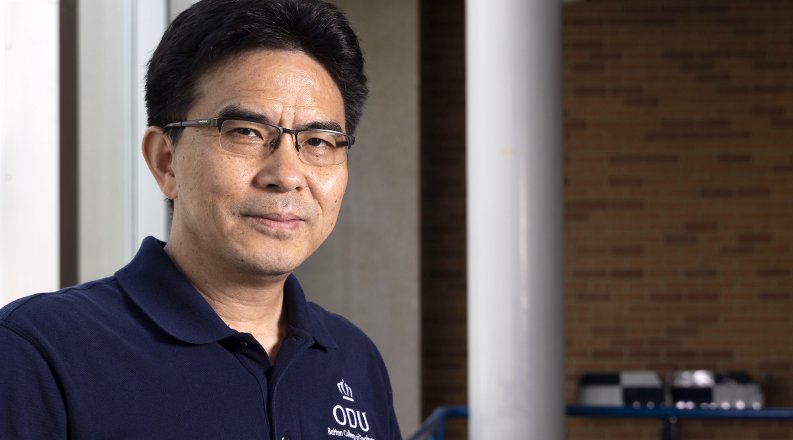The use of artificial intelligence is growing – and so are our excitement and concern. Recently, Old Dominion University Professor Jiang Li of the Department of Electrical and Computer Engineering answered a few questions about the technology.
Li’s research is in applied machine learning and developing and customizing machine learning algorithms to solve practical engineering problems. Recent research interests focus on applications in remote sensing image analysis, generative AI models for image conversion, time series prediction and cybersecurity.
Q: Can you explain what artificial intelligence/machine learning is and more specifically what ChatGPT is?
Li: Let's begin with an answer generated by ChatGPT. "Artificial Intelligence (AI) is the development of computer systems that can perform tasks requiring human intelligence. Machine Learning (ML) is a subset of AI that focuses on algorithms allowing machines to learn from data and make predictions without explicit programming. ChatGPT is an AI application developed by OpenAI. It's a chatbot trained on internet text, generating human-like responses. It uses the Transformer model (Note: A language model developed by Google in 2017), enabling it to understand and generate coherent text. However, it's important to critically evaluate and verify the information provided by ChatGPT."
"Three unique properties/concerns of AI techniques are: 1) the evolution of AI technology is rapid, surpassing natural evolution; 2) the potential for AI to make decisions that undermine human control; and 3) the creation of new ideas by AI, which can lead to unpredictable consequences."
Q: How do you access ChatGPT?
Li: ChatGPT is accessible to anyone with internet access. There are two ways to utilize ChatGPT: 1) Register an account on the OpenAI website. Once you have an account, you can directly submit your questions through the web browser interface. 2) On March 14, OpenAI released ChatGPT 4.0, which offers access to the limited version through the ChatGPT Plus chatbot (a premium variant of ChatGPT) or via OpenAI's API. While the web-based ChatGPT service is free, additional services come with a cost.
Q: What type of impact will this technology have on society?
Li: I believe this has the potential to be a pivotal moment in human history. Some of the impacts include:
- Job displacement: Similar to revolutionary inventions like the printing press, ChatGPT has the potential to automate and replace numerous jobs on a much larger scale. However, it can also generate new job opportunities across various fields. The exact timeline for this displacement is uncertain, as it could occur in several years or decades. Training the workforce to adapt to this displacement poses a significant challenge for our society, while individuals face an even greater challenge in preparing themselves with the necessary skillset for the rapidly changing landscape.
- Enhanced productivity: ChatGPT, like a "superman" with vast knowledge, can serve as a powerful tool for information retrieval, assisting users in finding answers to their questions and exploring new topics. This improved productivity has the potential to revolutionize the way we live.
- Creative assistance: ChatGPT can also generate creative content, such as writing and brainstorming ideas, offering valuable assistance in creative endeavors.
Q: Are we moving too fast with this technology? How could it be regulated in the U.S. and globally?
Li: AI is evolving at an unprecedented pace, and I believe it is impossible to halt its progress. While I am not an expert on regulation, it is noteworthy that Congress has been swift to act. Recently, a congressional hearing was conducted involving OpenAI and others to discuss the regulation of AI technology. The key focus of the discussion was on regulating the deployment and usage of AI, rather than AI itself. One possible solution is to establish a regulatory agency, similar to the FDA, specifically dedicated to AI regulation. During the hearing, three principles were extensively discussed: transparency (requiring AI models to identify themselves as such and not as humans), accountability (imposing responsibility on users of AI models) and limitations on usage (restricting the application of AI to specific domains). Further hearings are anticipated in the future.
Q: What is the worst thing that could happen?
Li: Here are five potentially bad impacts:
- As mentioned previously, there is a significant concern regarding the unprecedented level of job displacement caused by AI. Some companies are already implementing large-scale layoffs due to automation.
- Another worrisome aspect is the weaponization of AI technology.
- Chatbots have the capability to establish a sense of intimacy with individuals through chat, potentially leading to the manipulation of personal behavior and opinions.
- Misinformation and disinformation generated by AI models are hard to authenticate.
- Some scientists, including Geoffrey Hinton, have expressed concerns about the potential existential threat to humanity if AI were to gain control.
Q: Is there anything under development to detect whether content is AI-generated?
Li: Numerous tools are under development. However, none of them has reached a satisfactory level of effectiveness yet.
What do you see for the future of AI?
Li: The future of AI holds the potential for both positive and negative outcomes, depending on the actions we take today. By learning from our past mistakes, we have the opportunity to harness the transformative power of AI and create a better life for everyone.



